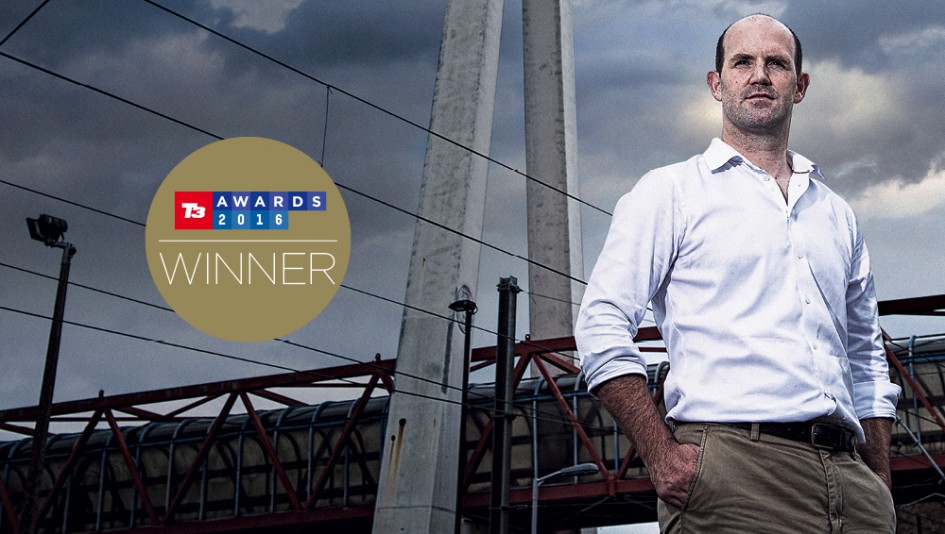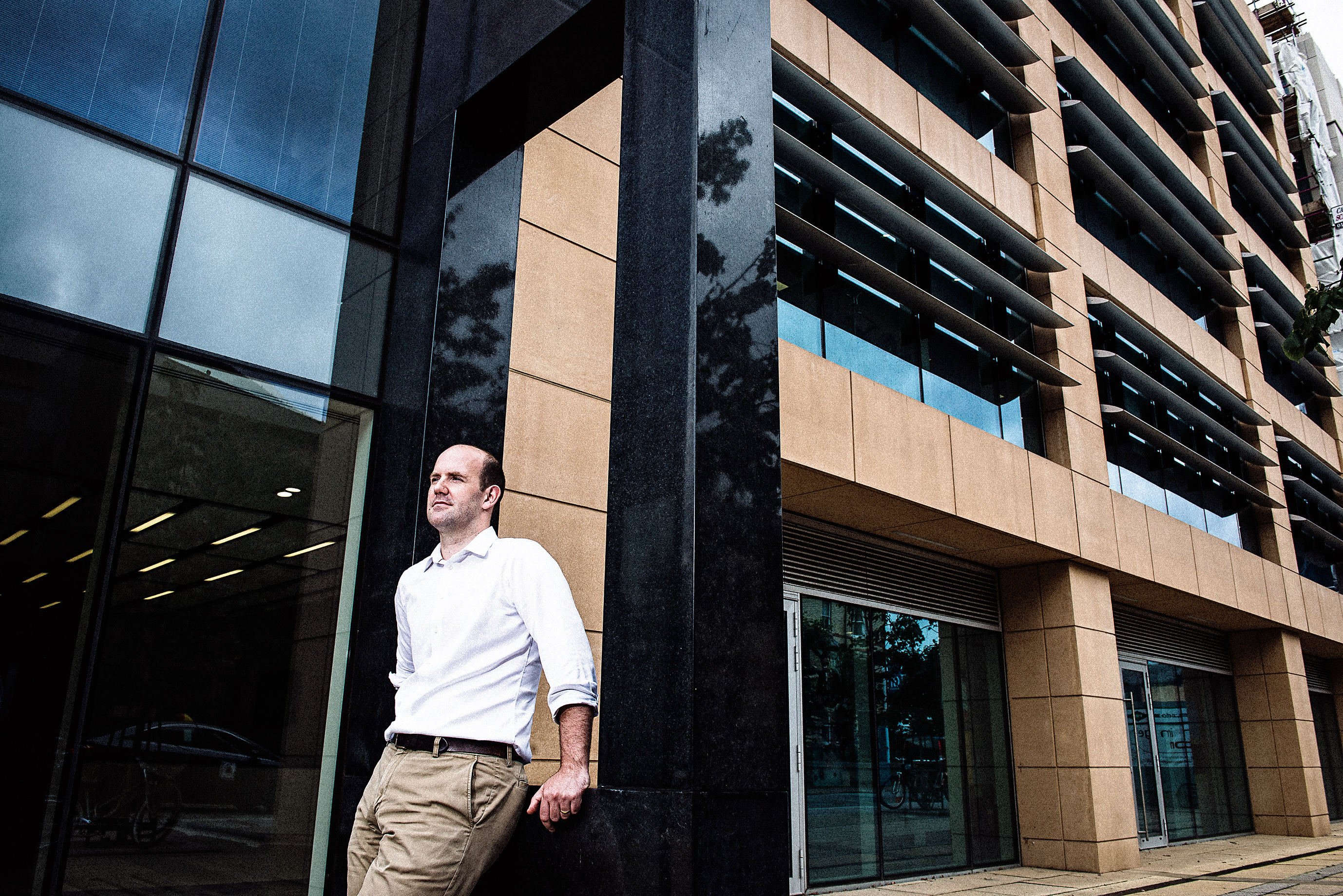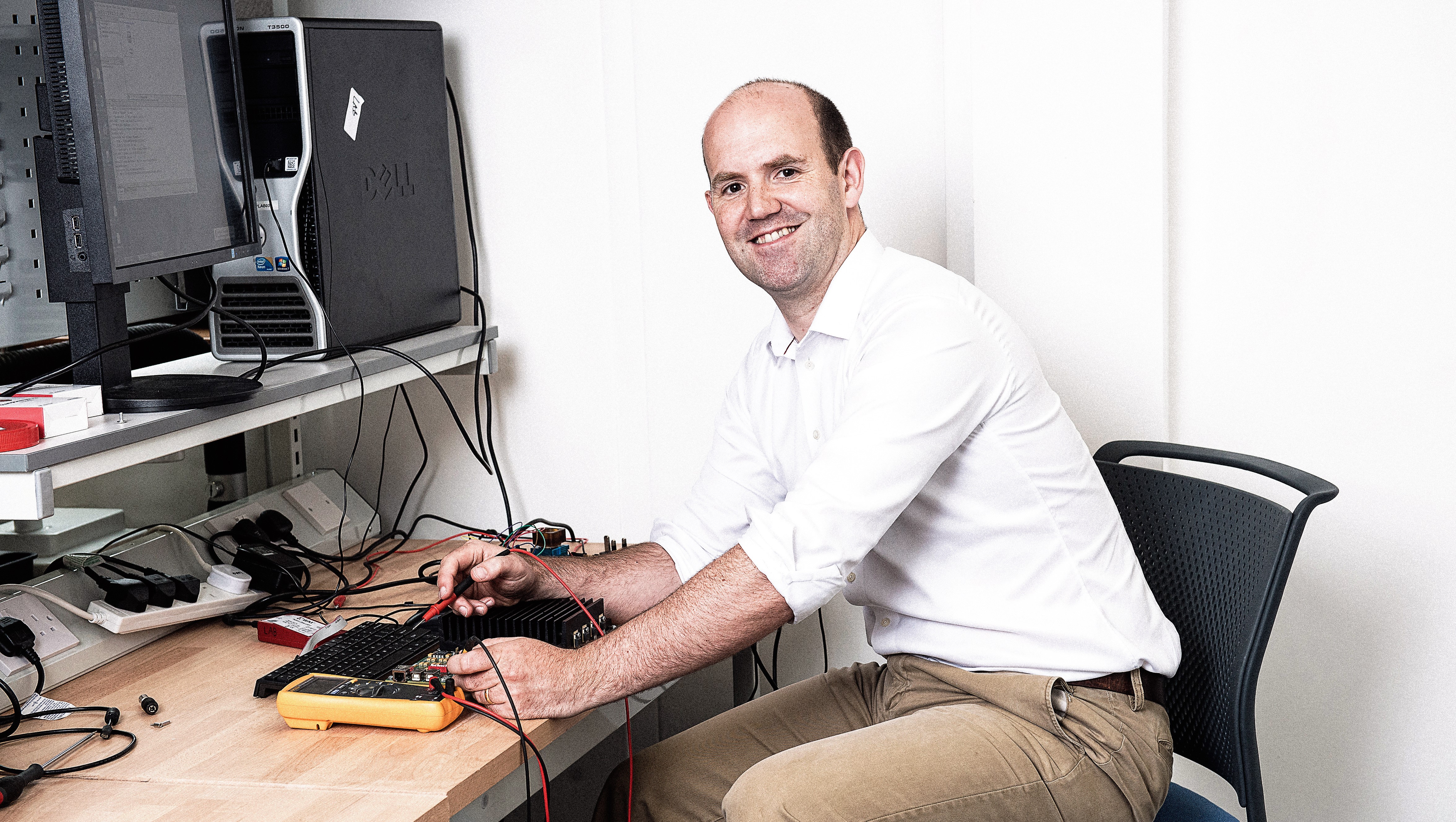Our Outstanding Contribution Award goes to...
Eben Upton was the deserving winner at the T3 Awards 2016

Get all the latest news, reviews, deals and buying guides on gorgeous tech, home and active products from the T3 experts
You are now subscribed
Your newsletter sign-up was successful
T3 pays tribute to the inventor of the world's best-selling credit-card-sized computer, and finds out why the future of computing should still be firmly rooted in the 1980s…
Eben Upton began tinkering with computers at an early age. When he wasn't sending off for pamphlets about maths problems to BBC shows like Think Of A Number, he was copying reams of BASIC code from computer books onto his trusty BBC Micro machine. Today, he's sold ten million Raspberry Pis and is CEO of a non-profit organisation dedicated to democratising computing.
We catch up with Eben Upton CBE to find out where it all started, what the future has in store for hobbyist computing, and to discuss the enormous contribution he's made to technology.
T3: For those who don't know, tell us what a Raspberry Pi is and why every home should have one?
Eben Upton: The Raspberry Pi is best described as a credit-card-sized PC.It costs $35 [£26], and all you have to do is plug it into your TV and it turns it into a computer. It'll do everything you'd expect from a standard home-office PC: write documents, create spreadsheets, browse the internet and watch movies, but it also includes everything you need to become a programmer – languages like Python, C++, Scratch and access to all the tools that can help you learn more about computing.
T3: Were you always destined to work in technology? What do you think hooked you as a boy growing up in the 1980s?
EU: I always had lots of type-in-code books, but I also had some higher-level, 'So, what's a computer?' books. They were all telling me that in the future there would be a computer in every home - as common as having a telephone or cooker. It seemed incredible at the time.
Get all the latest news, reviews, deals and buying guides on gorgeous tech, home and active products from the T3 experts
My youth made it really easy for me to be suckered into being a computer programmer. I think it helped that I'm one of those minority kinds of people who actually find computer programming itself interesting, rather than just the end goal.
T3: What's the genesis behind the Raspberry Pi, beyond your obvious love for fruit-based tech-firm nomenclature?
EU: I didn't really get into the hardware side of things until I finished my PhD in 2006. I was really burnt out and took a consulting gig with the guy who made motor controllers – he did a lot of Robot Wars hardware work before it became a popular TV show. This got me into AVR hacking, which is a really interesting halfway house between software and hardware. You write software that has this really low-level, deterministic interaction with the hardware, and that's what really got me interested in building computers, even considering my limited hardware skills at the time.
I built my very first computer back in 2006, and that was the very first thing you could call a Raspberry Pi. I then started working for Broadcom, but that idea of building a computer never went away. It wasn't until a bit later, when I was thinking about the computer-science recruitment crisis we had at Cambridge University, that the idea of making a small computer for the students to use came about. The notion of fixing this recruitment problem by making a piece of computer hardware seemed like a good idea at the time.

T3: How has the reception of the Raspberry Pi differed from your original vision?
EU: The success has been a real surprise. It's easily three or four orders of magnitude larger than we were ever expecting. We thought we'd sell between one and ten thousand units. Today, we're at ten million units.
Our big worry when we first started the Raspberry Pi project was that the kids wouldn't care about it; that we'd make this thing and it just wouldn't work out. As far as we could see, there were two possible explanations as to why kids weren't programming any more: one was that they didn't have access to the hardware they needed to program, and the other was that they simply didn't care about it; that they just wanted to go on Facebook. It turns out that our first hypothesis was correct: the lack of a programmable platform was the only thing standing between a bunch of kids doing a bunch of programming.
T3: Has your end goal changed as a result?
EU: Our goals now are basically the same, but much bigger. It's not just about an extra 200 applicants for computer science at Cambridge any more; it's about making sure no one in the world – including the developing world – is held back by the lack of accessible hardware. That's a satisfyingly vast goal. We're not yet anywhere near achieving that one, and we're not going to have achieved it until we've sold at least 100 million Raspberry Pis.
T3: Are you confident the Raspberry Pi is fulfilling the original goal of encouraging more kids to try computer science and follow careers in the technology sector?
EU: We're seeing an impact on the uptake of computer science in universities, and that's due to the combined efforts of a lot of organisations like the Raspberry Pi Foundation pushing in the same direction at the same time. Anecdotally speaking, I definitely think it's encouraging children into computing. All you've got to do is go to a community event like a Raspberry Jam, or look at what the kids are putting on Twitter and Facebook – there are thousands of kids doing things with Raspberry Pis, and it's a great sign for the future. Am I totally happy with the diversity? No. We're doing better, but we need to keep working to make sure we get girls as excited about computer science as boys. We need to continue to do more to help people from less advantaged backgrounds, too – that's a key area for us. A career in computing can be a great ladder for social mobility, and a greatway for people to climb up into well-paid and rewarding careers.
Ultimately, though, I don't have a precise answer to that question, and that's a bad thing. As the Raspberry Pi Foundation scales up, we're continuing to do research… to go out and measure our impact and learn from it. We're finally in a position where we can do that.
T3: The Raspberry Pi Foundation teamed up with British astronaut Tim Peake, with the Astro Pi project. It was a great chance to raise public awareness. Did it work?
EU: I'm the kind of guy who's excited by computing, but most people aren't like that. Most need the eye candy, an extra interest factor to inspire them. Astro Pi has been a real success in generating excitement around computer science, and it's been successful in the UK. We've got two Raspberry Pis on the International Space Station and, provided we can get astronaut time, we'd love for it to continue – there's plenty of scope to take it further.
It was wonderful to see schoolchildren in the UK get so excited about Tim Peake going to space. When I was a kid, I used
to care a lot about astronauts going to space, [but] do kids these days want tobe astronauts? It turns out they do. It's great to see so many kids excited about technology in general, and not simply passive consumers of 'stuff'. Thankfully, they're as excited by the idea of someone climbing into a spacecraft with a million moving parts and going into space as I am.

T3: What sort of future do you envisage for hobbyist computing in general?
EU: There's always a risk of [it being]a flash in the pan. I think the key for it not to be a fad is to put proper infrastructure around it. Teaching materials, teacher training, and things like after-school clubs, community events and so on. In the 1980s, there was a whole infrastructure around hobby computing, and we need to boot that back up in a stable way so that itcan't wither and die again – it needs to be sustainable. There's much more involved with it than making a small computer. There's a lot of work to be done, but we're working on it and we're not alone in that.
T3: What does it mean to be recognised for your outstanding contribution to tech, and to be held in the same esteem as past winners like Sir David Attenborough?
EU: I'm super-pleased! The fact thatT3 has shown such an interest in the Raspberry Pi tells me something about what we've achieved, but it also tells mea lot about how we misunderstood the market for the Raspberry Pi at first. The fact that this is a tech-savvy, consumer-focused publication, and not a hardcore engineering-focused journal, tells me
that we misjudged the potential early on. You look at everything else that it's in T3… There's nothing that doesn't have a shiny box, so the fact that this is an interest to T3's audience correlates with the surprise commercial success we've had.

For 25 years T3 has been the place to go when you need a gadget. From the incredibly useful, to the flat out beautiful T3 has covered it all. We're here to make your life better by bringing you the latest news, reviewing the products you want to buy and hunting for the best deals. You can follow us on Twitter, Facebook and Instagram. We also have a monthly magazine which you can buy in newsagents or subscribe to online – print and digital versions available.
